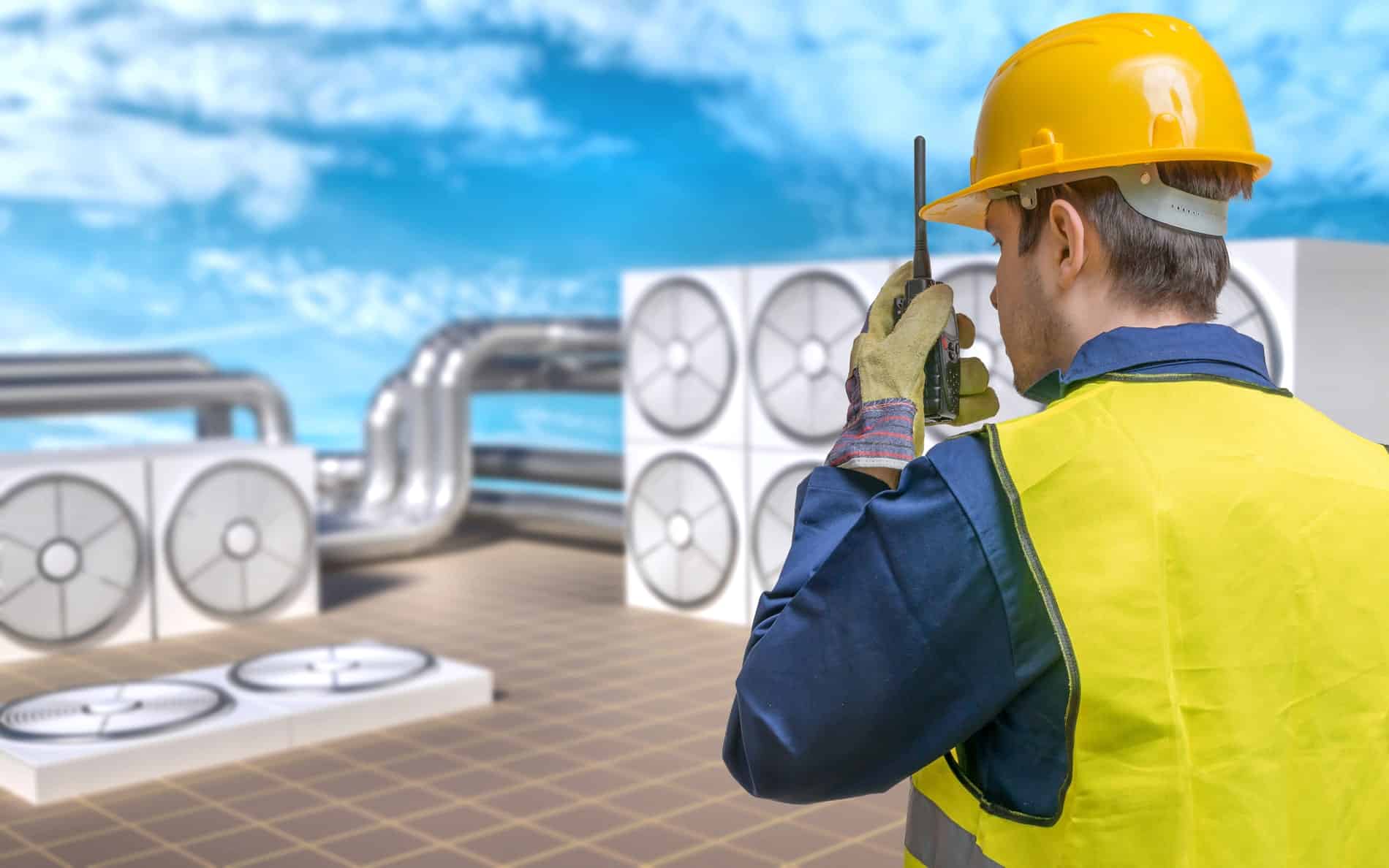Table of contents
A Brief History Of HVAC Systems
What To Look For In A Commercial HVAC System
A Look At The Different Types Of HVAC Systems On The Market
Single-Split HVAC Systems
Multi-Split HVAC Systems
VRF & VRV Systems
The Life Cycle Of Your HVAC System
When To Replace Your Commercial HVAC System
Conclusion
About Verde Solutions

Running a successful business is without a doubt hard work. And maintaining a healthy working environment for your employees is no simple task.
Finding the right HVAC systems for your commercial buildings should be one of the top items on the agenda. But with so many options on the market, the task is often a lot easier said than done.
We can all appreciate the reasons for wanting conditioned air for improved comfort and air quality. Below we’ve lined out a guide on commercial HVAC systems with everything you need to know before making the best choice ahead of your next purchase.
Article at a Glance
- Single-split HVAC systems are affordable and easy to install but require multiple outdoor units.
- Multi-split systems reduce the need for outdoor units and offer versatile air conditioning.
- VRF/VRV systems provide precise control for large buildings but have high installation costs.
A Brief History Of HVAC Systems
The concept of air conditioning can be traced back to the Roman times. The Han Dynasty in ancient China introduced saunas and rotary fans to manually cool the air. Here in America, wood stoves were used as early as the 17th century and the technologies used have evolved at a rapid rate.
Nowadays, we have electrical HVAC systems that can control the climate with great accuracy. They are capable of heating or cooling air to your desired temperature which can be set remotely via a dial or button. Meanwhile, advanced systems can control humidity levels and other elements to provide the best home and working conditions.
These advancements in technology have created further possibilities thanks to solar energy, wind energy, and geothermal properties. This creates a far better situation than ever before, especially with Verde Solutions and our focus on modern solutions to help businesses across the country.
What To Look For In A Commercial HVAC System
There are several differences between commercial and residential HVAC systems. The biggest difference between the two is the size of the room or building that they are to be used in. Commercial facilities often need to treat far bigger spaces. In some cases, though, the machines may need to work harder due to harsh working conditions, particularly when dealing with manufacturing areas.
Nevertheless, the basic principles of commercial HVAC systems are fairly similar to standardized home units. Central cooling is achieved courtesy of an outdoor condenser coil and compressor and an indoor evaporator coil. Heat in the air is transferred to the refrigerant, which then reaches the coil. This cools the air, which is then pumped into the building or room.
Central heating, meanwhile, warms combustion gases via a heat exchanger. Once the air has been warmed, it is spread throughout the commercial property. Both the heating and cooling processes are supported by an ability to filter the air, removing harmful particles.
When selecting an HVAC system for commercial buildings, there are several factors to consider. Be sure to ask yourself the following questions:
• Is it the right system considering the outside climate?
• Does the manufacturer boast the desired reputation?
• Is the HVAC system big enough for the property and usage requirements?
• Does the system boast the right eco-friendly properties?
• Are the facilities Energy Star certified?
• What type of technology is used?
With regards to the last point, you could find that the HVAC system is a Packaged System. Which means the heating and cooling units are combined as one unit. Opting for a unit that operates with a heating pump that additionally serves as a cooling system can work wonders too.
Finally, some commercial spaces do not have the room or the environment for a traditional system. In this case, analyzing the option of a ductless system is advised.
The Different Types Of HVAC Systems On The Market
The benefits of having a quality HVAC system in place are very hard to ignore. They can impact staff morale and productivity while also protecting employee and customer health through improved air quality. This can prevent the growth of mold, damp, and dangerous materials.
While some many different variations and setups can be customized to the needs of your business, commercial HVAC systems commonly fall into one of three categories. Let’s talk about them.
Single-Split HVAC Systems
Designed primarily for small to medium-sized businesses, the single split system offers an affordable and practical approach to HVAC requirements.
Small offices, server rooms, shops, or restaurants can all benefit from this option as individual rooms can be controlled with heating and cooling.
They are controlled by a thermostat control panel on the wall and they include a furnace, air conditioner, and refrigerant. Due to their efficiency (both in terms of performance and cost), they are among the most popular options on the market.
Pros of Single-Split HVAC Systems
- They are incredibly affordable even when you need to have several units in different areas.
- The self-contained nature of the units means that damage to one item doesn’t ruin everything.
Cons of Single-Split HVAC Systems
- Despite boasting easy installations, they can be quite a time-consuming task when using several models.
- They take up a lot of space, not least because each indoor unit requires an outdoor unit.
Multi-Split HVAC Systems
Multi-split systems are primarily designed with medium to large business in mind. It is possible to connect up to nine indoor units with one outside unit, hence the ‘multi’ part of their name. Meanwhile, the compressor can work at varying speeds thanks to inverter technology.
The smart systems can detect changes in the air and make the necessary changes in an automated manner. This can help reduce the use of energy while the pumps work alongside the heat’s natural inclination to move between warm and cold areas before getting to work with great efficiency.
Pros of Multi-Split HVAC Systems
- The need for outdoor units is reduced by up to 900% preserving the look of the building.
- Ceiling and wall mounted air conditioning units can be used for great versatility and control.
Cons of Multi-Split HVAC Systems
- The costs of installations are high due to the requirement of more pipework than single units.
- A problem with the external unit can potentially affect several parts of the commercial building.
VRF & VRV Systems
Variable Refrigerant Flow or Variable Refrigerant Volume systems are a commercial type of HVAC facility that comes in two variants, Heat Pump and Heat Recovery. These systems can be used in a variety of business settings including retail, large office space, and hotels. They can also be used in mixed spaces too.
Heat Pumps are great for open-plan spaces and can provide either heat or coolness. Heat Recovery can provide heat and cold simultaneously by gathering waste heat. This is particularly ideal when it needs to work in several rooms or environments, which may each have specific climate needs.
Pros of VRF and VRV Systems
- Easy to control and can be used in large buildings thanks to their ability to control individual areas.
- Arguably the most flexible option on the market while they can include modern green tech too.
Cons of VRF and VRV Systems
- The most expensive purchase of the lot and this large outlay extends to installation and maintenance.
- The outside unit will be under a lot of pressure, so you may need a backup condenser unit in case.
If you’re still a little unsure as to which unit is best for your business, our energy efficiency consultants can talk you through all options in detail.
The Life Cycle Of Your HVAC System
HVAC systems are not built to last forever but with regular maintenance, they can last you a very long time. In most commercial spaces, an annual inspection and servicing should be enough. However, testing conditions may lead you to get the facilities checked every 4-6 months instead.
If you keep your facilities in great health, you can get several years of service out of them. Furnaces last for around 15 years, heat pumps last for 16 years, and A/C units last anywhere between 10-15 years. Once again, though, if you don’t take care of them, the lifespan will be significantly reduced.
With the support of a professional commercial energy consultant, you are sure to see the HVAC systems will reach the upper end of those expected time frames. Our energy consultants in Chicago at Verde Solutions are the perfect solution.
When To Replace Your Commercial HVAC System
Buying the right HVAC system for your commercial property will serve you well throughout the life cycle of the machine, resulting in reduced maintenance and running costs. Nonetheless, it’s important to accept that all HVAC equipment will need replacing at some point.
There are many key faults and performance issues to look out for. While there are several situations where repair jobs are the ideal solution, our comprehensive guide on when to replace the commercial HVAC system should provide clarity on your current and future situations.
Optimize Your HVAC System with Expert Consultation
HVAC systems can have a bigger impact on your business than you might expect. That’s why it’s important to consider all of your options before making your final decision. Verde Solutions energy consulting firm can work with you to discuss the needs of your business.
Our engineers have had a leading role in the design and engineering of projects of varying size and complexity, which include commercial, institutional, and industrial facilities.
We specialize in systems using advanced technologies such as:
• Computerized controls
• Variable air volume (VAV) systems
• Variable volume pumping
• Building automation systems
Our experts will work with you to find the very best system and complete an efficient installation. Give us a call at 800-541-1137 to discuss your options.
About Verde Solutions
Verde Solutions is full full-service, energy efficiency consultant firm founded on three main principles; Innovation, Sustainability, and Efficiency. At Verde, we create value for our clients and communities by providing innovative energy-efficient solutions. By reducing energy use and utilizing renewable energy, we lower costs and set a sustainable path for the future.

